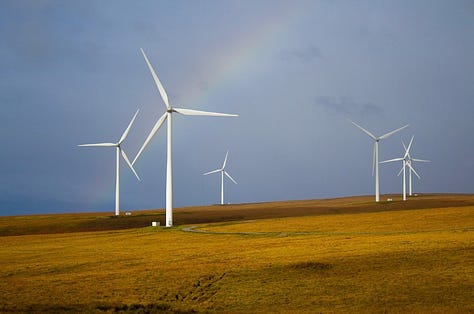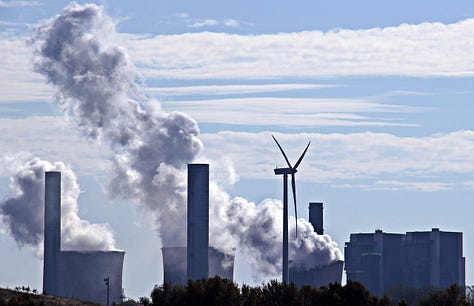Green Lights April 11: Top stories this week
Don't miss a single story from the best of Callaway Climate Insights.






. . . . Welcome back to Green Lights. Here’s our roundup of the best of Callaway Climate Insights. This week, David Callaway explains head fakes and headline risk. He also looks for opportunities in sectors and among companies that can ride out the tariff uncertainty. Oh, and coal’s still over. Have a great weekend and please subscribe to support our climate finance journalism.
. . . . Did we warn about head fakes and headline risk? Yes, yes we did. On Tuesday. That’s when David Callaway wrote, “Monday’s $6 trillion turnaround in stock prices in just a few minutes on a false tweet about a delay in tariffs was a prime example, with bots loaded for any sort of headline that indicated the harmful tariffs were off.” But wait, there’s more. On Wednesday, stocks surged after President Donald Trump actually did pause many of the largest U.S. tariff hikes. And that amazing rally was followed by another stunning selloff Thursday. So, financial markets are still swamped with uncertainty. And, Callaway says, climate investors — all investors — need not panic. Or even try to pivot. Sometimes it’s better to just watch the show and wait for bargains.
. . . . As the impact of the Trump attack on climate initiatives starts to bite in the form of abandoned clean energy projects, failed companies and laid-off workers, a unique opportunity has opened up for those who can weather the storm. Like the sudden collapse in the stock market creating values in popular stocks, the economic turmoil creates unique opportunities for those companies and projects strong enough to hang on through this period of tariff uncertainty.
. . . . As much as the world rushes to push fossil fuels to feed the frenzy in AI data centers, renewable energy will still make up the bulk of power demand for them in the next decade, the IEA reports. Unfortunately, up to 20% of planned growth could be delayed because of outdated and inefficient electric grids. As we talk more about energy security, it may be that it’s not how much energy we have but how we push it out that is the real security issue.
. . . . Anyone who’s ever poured a batch of dusty charcoal into a Weber grill knows coal isn’t beautiful or clean, writes David Callaway. And anyone who thinks energy companies are going to invest millions on new coal plants just because President Trump says so should talk with our blacksmith. The flurry of executive orders this week designed to rebuild the dying coal industry is but the latest example of MAGA disinformation campaigns running up against rational markets. In the end, customers will choose the cheapest, most reliable energy source, and coal’s days are over.
. . . . A GOP effort to boost the fossil fuel industry’s nascent carbon removal strategy has come up with a unique new idea — ride the international tariff wave. Instead of passing a carbon border tax on exports of dirty metals, cement and renewable energy components, two Republicans have renamed it the Foreign Pollution Fee Act and directed it at China.
More greenery . . . .
Let it flow: White House reverses water conservation standards (The Associated Press)
Even the bugs are leaving: Pests are moving to cooler regions due to climate change (Earth.com)
Canceled: Trump moves to hobble major U.S. climate change study (Politico)
First, more coal production: Trump issues order to block state climate change policies (Reuters)
Banks and insurers say: Climate Change Could Become a Global Economic Disaster (The New York Times)







When we bought our home in Berkeley in 1992, we had to put in a low flow shower head, low flow faucets, and a low flow toilet, according to city regulations when a house changed hands starting in 1985. Once again, Berkeley leads the nation in conserving water with none of the bad effects Trump claims. Of course, he also says he has beautiful hair. Bonus, it has saved money on our water bill ever since. As my parents would say, "waste not, want not."